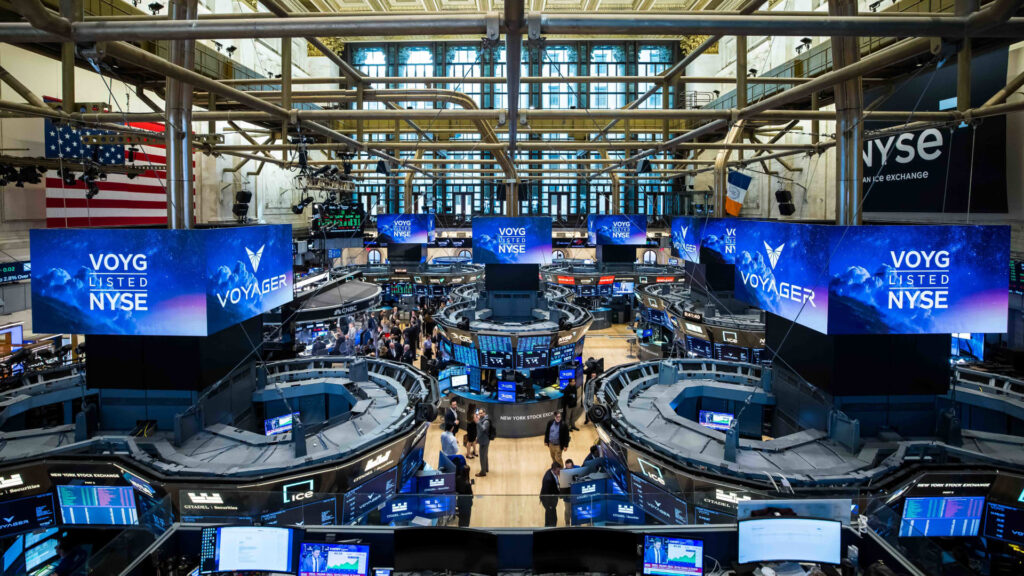[ad_1]
Disruptive space and defense tech company Voyager Technologies has quickly captured the eye of several Wall Street firms. Analysts from big-name firms, such JPMorgan and Morgan Stanley, initiated coverage of the stock this week with bullish ratings and price targets that suggest substantial upside ahead for the newly public company. Voyager is a risky but fruitful investment into a huge growth market, according to many analysts, who are counting on the company’s Starlab commercial space station as the ultimate upside opportunity for the firm. Voyager owns 67% of the Starlab joint venture, which is planned to replace the International Space Station. VOYG 1M mountain Voyager Technologies shares over the past month Analysts also expect Voyager to benefit from robust growth in defense and space products and the Trump administration’s effort to build a Golden Dome. Voyager made its NYSE debut on June 11 through an upsized initial public offering , which successfully raised $382.8 million by selling nearly 12.4 million shares. Shares of the Denver-based company had opened 125% higher on IPO day at $69.75 apiece, above the $31 offer price, and ended the day at $56.48 per share. Trading remains volatile, however. The stock on Monday last traded at around $40 per share. Morgan Stanley and JPMorgan were joint-lead book-running managers for Voyager’s IPO. Barclays, Jefferies, BofA Securities, KeyBanc Capital Markets and Wolfe | Nomura Alliance were book-running managers for the offering. Take a look at how Wall Street is betting on Voyager: JPMorgan: Initiated at overweight with $52 price target Analyst Seth Seifman forecasts shares to reach $52 by Dec. 2026, which suggests about 23% upside from Thursday’s close. Seifman’s valuation reflects the fact that Voyager should grow faster than defense companies Kratos Defense & Security Solutions and AeroVironment, but its business is not as developed compared to Rocket Lab and Karman Holdings, he said. “We forecast a 30% topline [compound annual growth rate] for 2026-30 (5 years) to ~$600m with a 16% adj [earnings before interest, taxes, depreciation and amortization] margin by 2030; that excludes the space station, which could become the most financially meaningful part of the company in the next decade. … ‘Space station as a business’ is a novel endeavor but we believe owning a portion of the very limited real estate in space where companies can develop and produce highly specialized products will be valuable.” Bank of America: Initiated at buy with $50 price target Bank of America’s estimates similarly reflect a 2026 year-end multiple for Voyager that is slightly higher than its defense tech peers. The firm’s $50 price target suggests 18% upside from Thursday’s close. The multiple “fairly reflects the company’s offerings across guidance, navigation & control systems, exposure to critical and well supported national security and space programs, and upside opportunities presented by Starlab and M & A,” analyst Ronald Epstein said. He added that the Golden Dome is driving growing demand for hardware and software produced by companies such as Voyager. Risks remain, however. “While VOYG’s capabilities and end market exposure are attractive, investment in VOYG remains relatively risky. The company currently underperforms defense tech peers on profit metrics, and we expect Adj. EBITDA to remain negative through 2028.” Wolfe Research: Initiated at outperform with $50 price target Analyst Myles Walton is bullish on Voyager’s organic growth potential in 2026 and beyond. Voyager’s defense and national security portfolio should drive its near- and medium-term opportunity, while Starlab gives the stock a “long-term compelling hook,” he said. “The opportunity for fast growth defense & space disruptive companies is real. Legacy technologies are being swapped out for cheaper & better commercially derived technologies/software and the historically glacial funding inertia that favors incumbents is melting as well. Voyager Technologies is an attractive way to invest in that disruption organically (25%+ growth), inorganically (8 acquisitions since ’19) with a multi-$B option in the replacement for the International Space Station.” Jefferies: Initiated at buy with $50 price target Jefferies analyst Sheila Kahyaoglu initiated coverage of the stock at a buy rating with a price target that accounts for a significant Starlab value. “The portfolio aligns with the current defense spending backdrop for growth in the munitions, ISR [intelligence, surveillance and reconnaissance], and space markets. Total VOYG revenues expand at a 67% CAGR on our estimates to $3.1BB by 2030 from $158MM in 2025. The core portion contributes $600MM at a 26% CAGR and Starlab contributing $2.5BB.” Morgan Stanley: Initiated at equal weight with $46 price target Morgan Stanley’s price target suggests about 8.6% potential upside for shares since Thursday’s latest close. Analyst Kristine Liwag said the stock is trading at a “balanced risk-reward” at current levels. “We see the company offering differentiated tech to growth end markets. The prospects for Starlab are bright, but a lot must go right to realize its potential. … Optionality around Starlab is significant for the investment story. Current trading levels suggest the market is ascribing at least some value to the concept.”
[ad_2]
Source link

